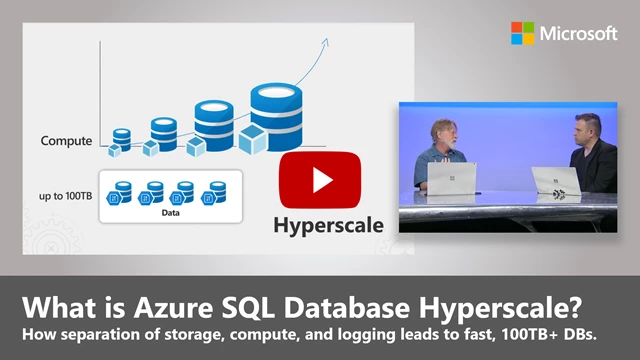Tomorrow, July 9, 2019, marks the end of extended support for SQL Server 2008 and 2008 R2. These releases transformed the database industry, with all the core components of a database platform built-in at a fraction of the cost of other databases. We saw broad adoption across applications, data marts, data warehousing, and business intelligence. Thank you for the ten amazing years we’ve had together.
But now support for the SQL Server 2008 and R2 versions is ending. Whether you prefer the evergreen SQL of Azure SQL Database managed instance which never needs to be patched or upgraded, or if you need the flexibility and configurability of SQL Server hosted on a Azure Virtual Machine with three free years of Extended Security Updates, Azure provides the best choice of destinations to secure and modernize your database.
Customers are moving critical SQL Server workloads to Azure
Customers like Allscripts, Komatsu, Paychex, and Willis Towers Watson are taking advantage of these innovative destinations and migrating their SQL Server databases to Azure. Danish IT solutions provider KMD needed a home for their legacy SQL Server in the cloud. They had to migrate an 8-terabyte production database to the cloud quickly and without interruption to its service. Azure SQL Database managed instance allowed KMD to transfer their production data with minimal downtime and no code changes.
“We moved our SQL Server 2008 to Azure SQL Database managed instance, and it has been a great move for us. Not only do we spend less time on maintenance, but we now run a version of SQL that is always current with no need for upgrade and patching.”
– Charlotte Lindahl, Project Manager, KMD
Azure SQL Database offers differentiated value to customers including:
- Chose the only cloud with evergreen SQL. Azure SQL Database compatibility levels mean that you can move your on-premises workloads to managed SQL without worrying about application compatibility or performance changes. Customers who move to SQL Database never have to worry about patching, upgrades, or end of support again.
- Host larger SQL databases than any other cloud with Azure SQL Database Hyperscale. Hyperscale is a highly scalable service tier for SQL databases that adapts on-demand to your workload's needs. With Hyperscale, databases can achieve the best performance for workloads of unlimited size and scale.
- Harness the power of artificial intelligence to monitor and secure your workloads. Trained on millions of databases, the intelligent security and performance features in Azure SQL Database mean consistent and predictable workload performance. In addition to intelligent performance, SQL database customers get peace of mind with automatic threat detection, which identifies unusual log-in attempts or potential SQL injection attacks.
- Move to the most economical cloud database for SQL Server, Azure SQL Database managed instance. With the full surface area of your on-premises SQL Server database engine and with an anticipated ROI of 212 percent and a payback period of as little as 6 months1, only SQL Database managed instance cements its status as the most cost effective service for running SQL in the cloud. SEB is a technology company providing software, solutions, and services specializing in managing group benefit solutions and healthcare claims processing. They chose Azure not only for its cost reduction compared to on-premises, but its more than 90 compliance offerings as well.
“With SQL Server 2008 approaching end of support, SEB needed to migrate two critical business applications that contained sensitive health and PII information. In Azure, we were able to get three years of Extended Security Updates for application VMs, and move the data to Azure SQL Database which significantly decreased both management and infrastructure spend. Azure's compliance certifications for HIPAA, PCI and ISO-27k, as well as data residency in Canada, were critical in meeting our regulatory requirements.”
– Mario Correia, Chief Technology Officer, SEB Inc.
See how Hyperscale in Azure SQL Database is enabling customer innovation.
SQL innovation remains our focus now and in the future
Microsoft continues to invest in innovation with SQL Server 2019 and Azure SQL Database. Our priority is to future proof your database workloads. Today, I am excited to announce new innovation across on-premises and in the cloud:
- Preview of Azure SQL, a simplified portal experience for SQL databases in Azure: Coming soon, Azure SQL will provide a single pane of glass through which you can manage Azure SQL Databases and SQL Server on Azure Virtual Machines. Additionally, available today, customers can register their self-installed (custom image) SQL VMs using the Resource Provider to access benefits like auto-patching, auto-backup, and new license management options.
- Preview of SQL Server 2019 big data clusters: Available later this month, the SQL Server 2019 big data clusters preview combines SQL Server with Apache Spark and Hadoop Distributed File System for a unified data platform that enables analytics and artificial intelligence (AI) over all data, relational and non-relational. Early Adoption Program participants like Startup Systems Imagination Inc. are already using big data cluster to solve challenging AI and machine learning problems.
“With SQL Server 2019 big data clusters, we can solve for on-demand big data experiments. We can analyze cancer research data coming from dozens of different data sources, mine interesting graph features, and carry out analysis at scale.”
– Pieter Derdeyn, Knowledge Engineer, Systems Imagination Inc.
Get started with SQL in Azure
As we reach end of support for SQL Server 2008 and 2008 R2, and with just six more months until the end of support for Windows Server 2008 and 2008 R2, there’s never been a better time to secure and modernize these older workloads by moving them to Azure. Secure, manage, and transform your SQL Server workloads with the latest data and AI capabilities:
- Find the best destination for your SQL Server 2008 and 2008 R2.
- Get started on your Azure migration with the Data Migration Guide.
1The Total Economic Impact™ of Microsoft Azure SQL Database Managed Instance, a Forrester Consulting Study, 10/25/2018. https://azure.microsoft.com/en-us/resources/forrester-tei-sql-database-managed-instance/en-us/
